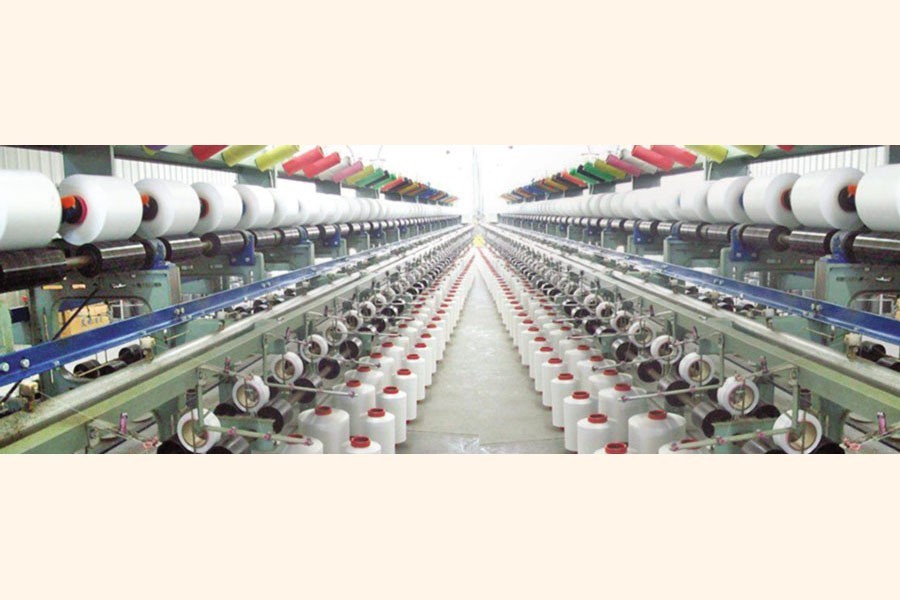The government has issued a new rule for investors of the clothing and textile industries, keeping a provision of getting environment and fire safety clearance first prior to obtaining factory registration.
However, textile mill owners opposed the move earlier citing the new set of regulations as a barrier to the investors.
The rules, issued by the Ministry of Textile and Jute recently, have been framed under the Textile Act-2018.
The rules, styled 'Textile Industry (registration and one-stop service centre) Rules-2021', have made it mandatory for investors to obtain both 'proposed licence' and 'existing licence' from the Department of Textiles (DoT).
The 'proposed licence' will be issued to the textile industries until starting commercial production - this licence will be valid for two years.
The investors will be eligible for 'existing licence' after starting commercial production.
But, terming the new rules a barrier, textile mill owners alleged that the investors would have to face hassle and probably bribe the DoT officials to obtain the licences.
Bangladesh Textile Mills Association (BTMA) Secretary Mansur Ahmed said many of the investors had long been waiting to get a licence from the DoT.
The department turns to a 'centre of corruption', he said, adding that the new rules would further worsen the situation.
"We do not find any necessity to impose such regulation on mandatory 'proposed licencing' from the DoT. It helps us get neither the bank loans nor the utility services," he said.
Responding to the FE's query on the allegation, Additional Secretary (Textile) of the Ministry of Textiles and Jute Mohammad Abul Kalam, who was involved in framing the rules, said textile industries needed the regulatory permission to operate.
"We have included one-stop services in the rules so that textile mill owners can avail services without harassment," he said.
Earlier, in November 2019, the ministry sought opinions from the stakeholders making the draft rules public.
In the draft, the BTMA then pointed out a number of areas, which are not relevant to the textile industry.
As per the rules, the entrepreneurs have to submit a copy of bank loans and foreign or local loan approval paper, if applicable, with the application for obtaining 'proposed licence'.
In a paper, submitted to the ministry on draft rules, the BTMA said it found no relevance of the bank solvency certificate of the investors with the proposed registration.
"The issue of obtaining foreign loan is solely personal and classified for an industry. The provision should be waived from the rules," it wrote.
On environmental clearance, the textile mill owners said knit, weaving and spinning mills did not process any wet materials so it was irrelevant for them to obtain the certificate.
However, following proposals of the BTMA, the ministry has waived the provision that makes the factory owners solely responsible for any fire incidence in the factory.
Punitive measures will be taken on fire incidence following the report of an investigation committee, according to the new guidelines.
As per the regulations, the investors will have to pay fees at the prescribed rates of the DoT to obtain the licences.
A licence fee of Tk 5,000 will be imposed on factories with investments of Tk 10 to 100 million, Tk 10,000 for factories with investments of Tk 100 to 250 million, Tk 25,000 for factories with investment of Tk 250 to 500 million, Tk 50,000 for factories with investment of Tk 500 million to 1.0 billion, and Tk 0.1 million for factories with investments of above Tk 1.0 billion.
The rules will be also applicable for primary textile, readymade garment, allied textile, and packaging and accessories manufacturers.
Investors will have to file applications with the DoT along with the documents of the updated trade licence, income tax certificate, certificate of incorporation as limited company and bank solvency certificate, factory layout plan approved by the Department of Inspection for Factories and Establishments, fire licence and environmental clearance.
The DoT will not accept any incomplete form except the required information, and a one-stop service centre will issue 21 types of services to the entrepreneurs, according to the new rules.
As per the rules, the registration of DoT will not help industries get financing from local or international sources or give relief from any kind of liabilities; industries will have to follow environmental and workplace compliances.


